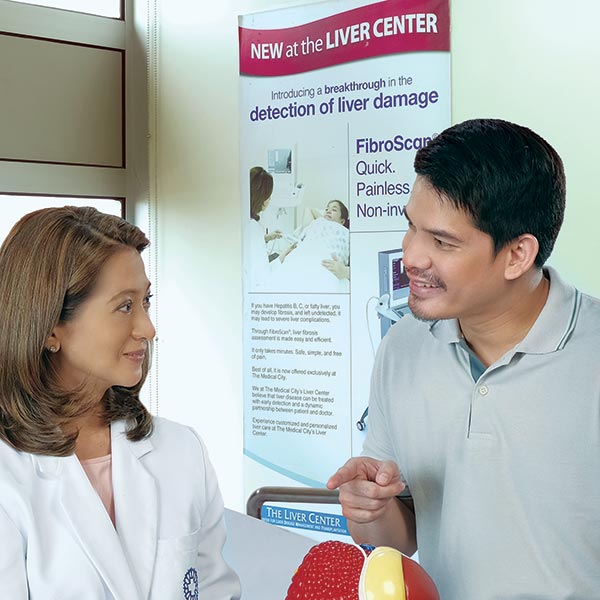Services
- Surgery (liver resection, liver transplantation)
- Local ablation (radiofrequency ablation [RFA], microwave ablation, percutaneous ethanol injection [PEI])
- Locoregional therapy (Transarterial Chemoembolization [TACE]
- Drug-eluting Bead Chemoembolization [DEB-TACE]
- Selective Internal Radiation Therapy [SIRT] with Yttrium90 beads)
- Systemic therapy (chemotherapy, molecular targeted therapy, biologic agents)
- Palliative Care
The CLDMT is likewise actively involved in viral hepatitis and liver cancer research, both locally and internationally.
FAQs
What is Liver Cancer?
Liver cancer is a type of cancer that starts in the cells of the liver. It can be either primary, meaning it started in the liver, or secondary, meaning it has spread from another part of the body to the liver. The two most common forms of primary liver cancer are hepatocellular carcinoma (HCC), which starts in the main type of liver cell, and intrahepatic cholangiocarcinoma (ICC), which starts in the cells that line the bile duct. It can also be a rare type called hepatoblastoma, which is more common in children under three years old.
What are the Causes of Liver Cancer?
The causes of liver cancer are numerous and can vary in complexity. One of the most common causes of liver cancer is chronic liver disease, specifically cirrhosis, which can be caused by chronic infection with hepatitis B or C. Other factors that can increase the risk of liver cancer include excessive alcohol consumption, obesity, and exposure to certain toxins and chemicals.
What are the Common Symptoms of Liver Cancer?
In its early stages, liver cancer may not cause any symptoms. As the tumor grows larger, symptoms such as abdominal pain, weight loss, fatigue, and jaundice may develop due to pressure on surrounding organs or interference with the liver's ability to function properly. Other symptoms may include an enlarged abdomen, itching skin, and swelling in the legs and ankles.
If you or your loved one are experiencing any of these symptoms, it's best to proceed to a liver cancer center for a full assessment.
How is Liver Cancer Detected?
Liver cancer can be a challenging disease to diagnose. Screening for liver cancer typically begins with a physical examination at a specialized clinic and a detailed medical history, as well as blood tests to check liver function. In some cases, imaging studies such as ultrasound, computed tomography (CT), or magnetic resonance imaging (MRI) may also be conducted to detect suspicious growths in the liver. Occasionally, a liver biopsy may be necessary to confirm a diagnosis.
It is essential to detect liver cancer early, and individuals who have risk factors such as a history of hepatitis B or C infection, heavy alcohol use, or a family history of liver cancer should discuss screening options with their doctor.
Who is at Risk for Liver Cancer?
Certain factors such as chronic hepatitis B or C infection, heavy alcohol use, obesity, type 2 diabetes, and non-alcoholic fatty liver disease can increase the likelihood of developing liver cancer. Additionally, exposure to aflatoxins, a type of toxin found in contaminated food, can also increase the risk. Despite these risk factors, it's important to remember that not everyone who has them will develop liver cancer.
Consistent monitoring and healthy lifestyle choices, such as limiting alcohol intake and managing diabetes, can make a significant impact in reducing the risks associated with this disease.
